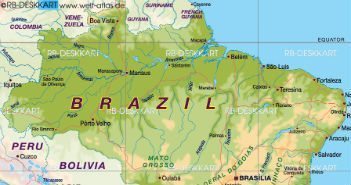The use of the AWS spectrum band (1700/2100 MHz) for LTE mobile services in Latin America is expected to have a huge positive economic impact, according to a recently released study by GSMA. The report also found that the spectrum band is key to extending existing “4G” deployments, ensuring economies of scale and seamless connectivity across the region. Currently, 12 countries in the Americas have licensed a portion or all of the AWS spectrum band. The GSMA study found that the total economic benefit of licensing the band in Latin American countries will be worth over $53 billion. The direct impact would be almost $30 billion from investments while the value chain dynamics of the mobile industry and growth in gross domestic product has an indirect impact of $23 billion, benefiting other industry sectors and productivity. In an interview with RCR Wireless News, Sebastian Cabello, director of GSMA for Latin America, said that the three major spectrum bands (700 MHz, AWS and 2.6 GHz) will coexist; however, in the short term, AWS and 2.6 GHz might dominate, but 700 MHz will be the most important band in the long term. “Cities need both, the high and the low frequency. The 700 MHz offers a seamless connectivity, and it’s better when it’s difficult to install more antennas, while higher bands are used to meet heavy data traffic,” Cabello said. New lab, World Cup preparation: Alcatel-Lucent held a press conference in Brazil to announce the launch of its laboratory for testing and certification of transport Internet-protocol networks. The work of the lab is focused on meeting the data traffic increase that carriers are facing. The company has invested $4 million to set up the first phase of the lab. The second phase which will focus on IP routing will be launched later this year. The facility is located in the Alcatel-Lucent’s Latin American headquarters in São Paulo, and it is expected to serve clients from the region. In addition, Javier Falcon, Alcatel-Lucent’s president for Brazil, unveiled plans for a task force to help meet operators’ needs during the FIFA World Cup, which begins on June 12. Additional technical staff are flying to Brazil to join the local team to provide support for carriers. Falcon said telcos are expecting a huge increase in data traffic. Alcatel-Lucent won distributed antenna system and Wi-Fi projects in the stadiums of Rio de Janeiro, Cuiabá and Natal. More news from Latin America:
In an interview with RCR Wireless News, Sebastian Cabello, director of GSMA for Latin America, said that the three major spectrum bands (700 MHz, AWS and 2.6 GHz) will coexist; however, in the short term, AWS and 2.6 GHz might dominate, but 700 MHz will be the most important band in the long term. “Cities need both, the high and the low frequency. The 700 MHz offers a seamless connectivity, and it’s better when it’s difficult to install more antennas, while higher bands are used to meet heavy data traffic,” Cabello said. New lab, World Cup preparation: Alcatel-Lucent held a press conference in Brazil to announce the launch of its laboratory for testing and certification of transport Internet-protocol networks. The work of the lab is focused on meeting the data traffic increase that carriers are facing. The company has invested $4 million to set up the first phase of the lab. The second phase which will focus on IP routing will be launched later this year. The facility is located in the Alcatel-Lucent’s Latin American headquarters in São Paulo, and it is expected to serve clients from the region. In addition, Javier Falcon, Alcatel-Lucent’s president for Brazil, unveiled plans for a task force to help meet operators’ needs during the FIFA World Cup, which begins on June 12. Additional technical staff are flying to Brazil to join the local team to provide support for carriers. Falcon said telcos are expecting a huge increase in data traffic. Alcatel-Lucent won distributed antenna system and Wi-Fi projects in the stadiums of Rio de Janeiro, Cuiabá and Natal. More news from Latin America:
- Virgin Mobile has received the green light from Brazil’s regulator Anatel to operate as an mobile virtual network operator. The company plans to launch mobile services over the next year.
- Spotify launched its on-demand music streaming service in Brazil.
- Mexican Maxcom, a quad-play communications service provider serving markets in Mexico, has selected NetCracker to deliver a large-scale OSS transformation.
- Ecuador’s state-owned operator CNT is launching 4G bundles with smartphones from Huawei, Samsung and Alcatel One Touch starting this summer.
- Brazil’s Oi launched a special offering for tourists visiting the country during the World Cup games. The offering includes a pre-paid SIM card and unlimited access to Oi’s Wi-Fi.
- Iusacell plans to disable its CDMA network in late 2015. Users will have to migrate to the carrier’s GSM-based network.
Wondering what’s going on in Latin America? Why don’t you follow me on Twitter? Also check out all of RCR Wireless News’ Latin American content.

